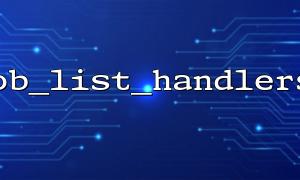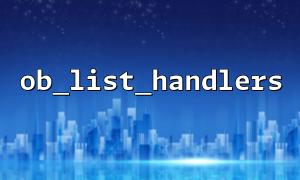In PHP development, cache control is a very important part, especially when you are processing large amounts of data. PHP provides the ob_list_handlers() function, which can list the handlers of the current output buffer. Mastering the use of this function can help you avoid unnecessary cache shutdown problems and optimize code performance. In this article, we will explore how to use the ob_list_handlers() function to avoid unnecessary cache shutdowns, and combine practical techniques to improve the robustness and efficiency of the code.
The ob_list_handlers() function is used to get all output buffer handlers registered in the current PHP script. It returns an array containing the names of all registered output buffer handlers. Typically, the output buffer handler will register when you call ob_start() . Through this function, you can understand the status of the current output buffer, thereby deciding whether to turn off or continue to use the cache.
In development, sometimes we encounter the problem that the output buffer is accidentally closed in some cases, especially when you don't want the buffer to be closed. By using ob_list_handlers() , you can check whether the output buffer currently exists to avoid cache closure caused by misoperation.
Suppose you are involved in jumping operations of multiple URLs when processing web page requests. If you do not want to turn off the output buffer when performing certain operations, you can use ob_list_handlers() to determine whether the output buffer already exists, thereby avoiding unnecessary cache shutdown. Here is an example:
<?php
// Register the output buffer
ob_start();
// Get the current output buffer handler
$handlers = ob_list_handlers();
// Check if there is currently an output buffer
if (in_array('ob_gzhandler', $handlers)) {
// If the buffer is alreadygzhandler,Avoid closing
echo "The cache handler is ob_gzhandler,No need to close cache";
} else {
// Otherwise, close the current buffer
ob_end_flush();
echo "The output buffer has been closed";
}
// Assume that someURLWhen requested,We don't want to close the buffer
$url = "https://gitbox.net/example/";
// Perform hereURLask
$response = file_get_contents($url);
echo "URLask结果:$response";
// Continue to perform other operations
echo "Continue to output";
?>
Through the ob_list_handlers() function, we can dynamically check which output buffers are currently registered, so that we can avoid closing the cache in use due to unexpected operations, ensuring that the output behavior of the script is in line with expectations.
In some complex scenarios, you may call ob_start() multiple times, and each call may use a different output buffer handler. Using ob_list_handlers() to view currently registered handlers can help you make appropriate decisions and avoid unnecessary cache shutdowns.
By using the ob_list_handlers() function, you can avoid performance issues caused by accidentally turning off output buffering in PHP development. Check the current output buffer handler to avoid accidentally closing the output buffer when data exists in the cache, which has a positive effect on improving the stability and performance of the system. I hope that the practical tips in this article can help you better control the use of cache control and output buffering.
END















